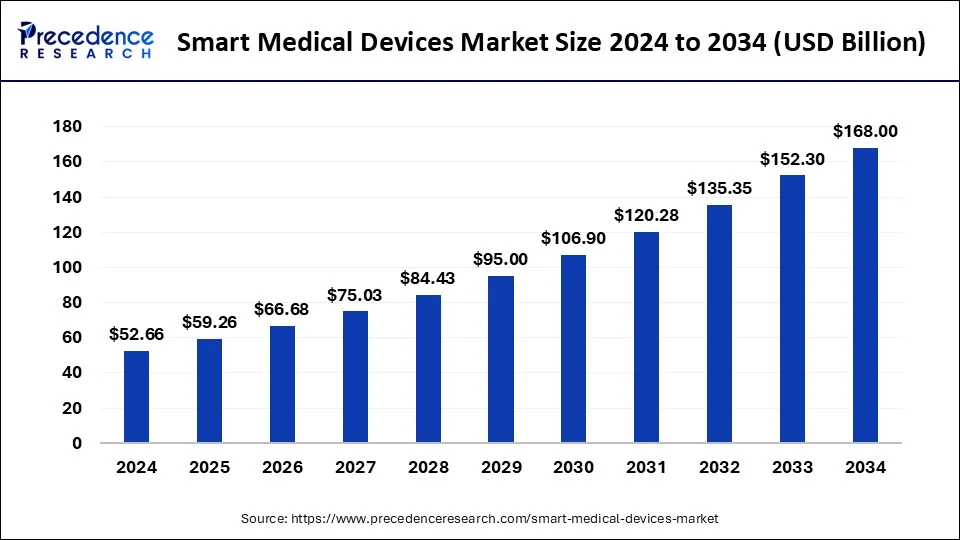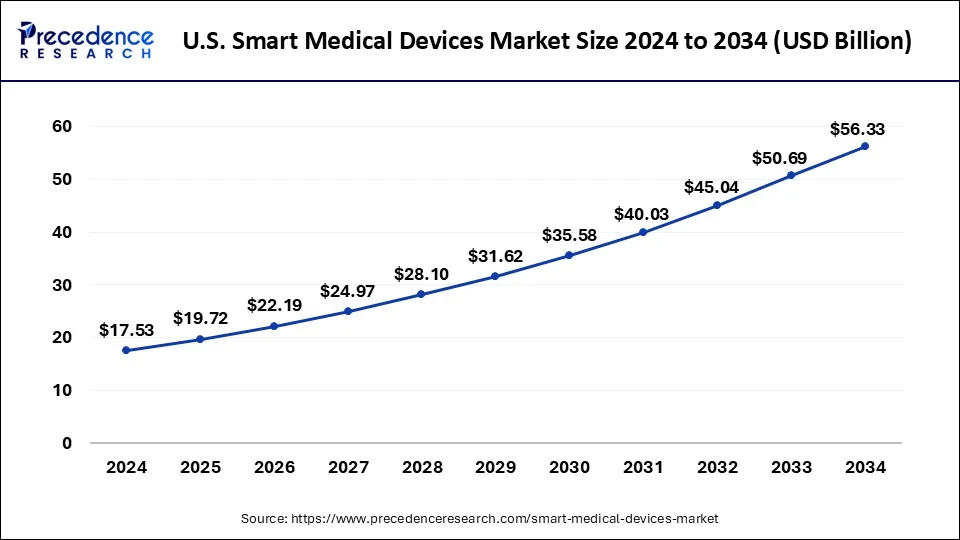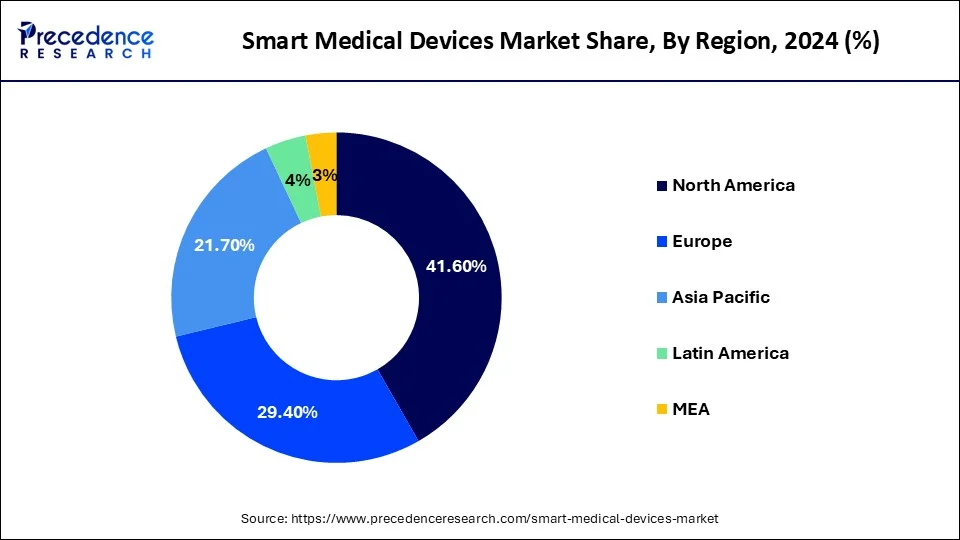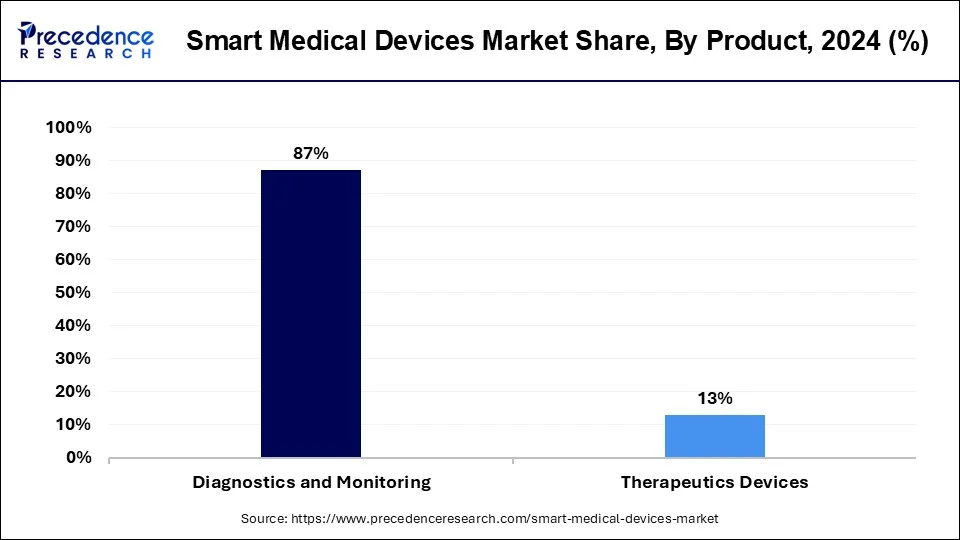May 2024
The global smart medical devices market size is calculated at USD 59.26 billion in 2025 and is forecasted to reach around USD 168 billion by 2034, accelerating at a CAGR of 12.30% from 2025 to 2034. The North America smart medical devices market size surpassed USD 21.91 billion in 2024 and is expanding at a CAGR of 12.31% during the forecast period. The market sizing and forecasts are revenue-based (USD Million/Billion), with 2024 as the base year.
The global smart medical devices market size was estimated at USD 52.66 billion in 2024 and is predicted to increase from USD 59.26 billion in 2025 to approximately USD 168 billion by 2034, expanding at a CAGR of 12.30% from 2025 to 2034. The rising technological integration in the medical industry drives the growth of the market.

The U.S. smart medical devices market size was estimated at USD 17.53 billion in 2024 and is projected to surpass around USD 56.33 billion by 2034 at a CAGR of 12.38% from 2025 to 2034.

North America led the smart medical devices market in 2024, the region is observed to have a sustained growth during the forecast period. The dominance of the market in the region is attributed to the early adoption of technologies in the medical sector and the higher investments in the development of healthcare in the countries like the United States and Canada are driving the expansion of the market. The higher presence of the major market players in smart medical gadgets is further propelling the growth of the market.
The rising chronic disease among the geriatric population also acts as a major factor for the higher demand for smart medical devices in the region. Additionally, North America is home to multiple manufacturers and investors for healthcare devices. This factor brings a significant opportunity for the region to sustain dominance in the smart medical devices market.

Asia Pacific is observed to witness the fastest rate of expansion in the smart medical devices market during the forecast period. The growth of the market in the region is increasing owing to the rising population and the chronic diseases in the geriatric population such as diabetes, asthma, and others that need to be regularly monitored that enhance the demand for smart medical devices. Technological integration in medical devices enhances the quality of the results and provides real-time insights into the health condition to the doctors or patients to make an informed decision.
The rising investments in the development of healthcare facilities and technological advancements are driving the growth of the market. Additionally, the rising research and development activities in innovation and the launch of new categories of smart medical devices are driving the growth of the market in the region.
Smart medical devices are automated machines, equipment, and instruments that use artificial intelligence and machine learning for the detection of the stages of diseases and give real-time insight into the patient’s health condition. Smart medical devices help in the diagnosis and treatment of patients. Smart devices are an efficient device that helps in remote health monitoring by the ehealth initiatives and reduce the visit to hospital readmission and doctor visits.
The smart devices have the two categories such as automated health management, and informational management. Automated health management provides real-time insights into the health of the patients to the physicians and informational devices are designed to collect the health information and display it to the patients to make an informed decision regarding their health. The rapid adoption of the technologies in medical devices is driving the growth of the smart medical devices market.
| Report Coverage | Details |
| Global Market Size in 2024 | USD 52.66 Billion |
| Global Market Size in 2025 | USD 59.26 Billion |
| Global Market Size by 2034 | USD 168 Billion |
| Market Growth Rate from 2025 to 2034 | CAGR of 6.01% |
| Largest Market | North America |
| Base Year | 2024 |
| Forecast Period | 2025 to 2034 |
| Segments Covered | Product, End-User, Modality, Distribution Channel, and Region |
| Regions Covered | North America, Europe, Asia-Pacific, Latin America, and Middle East & Africa |
Increasing demand for efficient healthcare operations
The integration of technologies in healthcare settings is driving the growth of the smart medical devices market. The rising prevalence of chronic diseases such as diabetes, asthma, and cardiovascular disorders which need regular monitoring drives the demand for smart medical devices. Smart devices are also known as IoT healthcare devices which include smart tools such as connectivity, sensors, and data analytics capabilities and are widely being used in the healthcare industry. Smart medical devices provide real-time data about the patient’s health condition, increase patient engagement, and maintain their healthcare process. Smart devices include gadgets like smartwatches, wearable fitness trackers to remote monitoring systems.
The increasing demand for remote monitoring systems that help to monitor the condition of patients with chronic disorders at home with the integration of various devices and sensors to monitor. These tools can track the symptoms, vital signs, and medical adherence, which are sent to medical professionals for proactive interventions. Thus these factors are positively influencing the growth of the smart medical devices market.
Lack of proper infrastructure
The insufficient amount of infrastructure and the lack of skilled professionals in technology development restrains the growth of the smart medical devices market. This factor generally acts as a hampering one in underdeveloped areas, where lack of healthcare infrastructure, absence of skilled professionals and slow pace of adoption for such devices create a major restraint for manufacturers and investors from expanding business in such areas. The challenge is observed to get addressed with government initiatives and private investments that can boost the adoption of smart medical devices in such parts.
Innovations in medical devices
The ongoing advancements in the medical devices and the healthcare sectors are observed to offer lucrative opportunities for the smart medical devices market. The integration of smart technologies helps healthcare professionals to make informed and strategic decisions about the health of the patients. There are some of the smart medical devices that are observed as emerging trends in the healthcare system such as wearables, medical robots, immersive technologies, 3D printing, and artificial intelligence, the internet of medical things, cybersecurity, medical waste management, minimally invasive devices, and 5G.
The rising focus and interest in automation of healthcare devices promotes the implementation of AI, medical robots, and immersive technologies in the medical devices industry. Additionally, the rising investments in the innovation of technologies in the healthcare industry also contributes to the growth of the smart medical devices market.
The diagnostics and monitoring segment dominated the smart medical devices market with the largest market share in 2024. The dominance of the segment is attributed to the rising demand for smart medical devices for the diagnostics and monitoring of chronic diseases such as diabetes and others. Smart medical devices give real-time information about the condition of the diseases of the patient which helps to take an informed decision regarding the diseases. The diagnostics and monitoring segment is further divided into the blood glucose, pulse, blood pressure, and heart rate monitoring.
The rising investments in technological advancements and the supportive government initiatives with subsidies and policies for the development and implementation of smart medical gadgets are driving the growth of the segment.

Among all diagnostic and monitoring tools, blood glucose monitoring tools are considered to be the most prominent ones. The rising cases of diabetes across the globe act as a major factor for the increasing utilization of blood glucose monitoring tools across the health industry. Along with this, the rising emphasis on utilizing diabetes detection tools at home by patients under the trend of home-health care settings creates a significant opportunity for the segment to grow.
The hospitals segment held a considerable share of the smart medical devices market in 2024. Hospitals operate within a highly regulated environment, with strict requirements for patient safety, data security, and regulatory compliance. Smart medical devices that meet regulatory standards and quality certifications are preferred by hospitals, as they offer assurance of reliability, accuracy, and data integrity.
The homecare settings segment is expected to have a significant rate of growth in the smart medical devices market in 2023.
The growth of the segment is attributed to the rising number of the geriatric population having the chronic diseases and need the regular monitoring driving the demand for the high-quality medical services at their home comfort that boosts the growth of the segment. The rising adoption of telehealth, e-healthcare initiatives and smart medical devices that gives accurate results for the health condition in homecare enhances the expansion of the homecare settings segment.
By Product
By End-User
By Modality
By Distribution Channel
By Geography
For inquiries regarding discounts, bulk purchases, or customization requests, please contact us at sales@precedenceresearch.com
No cookie-cutter, only authentic analysis – take the 1st step to become a Precedence Research client
May 2024
January 2025
September 2024
January 2025